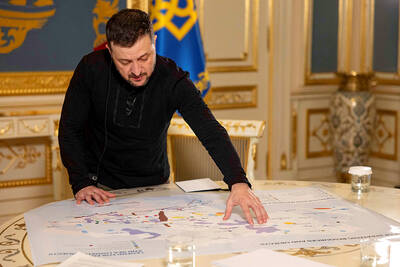Iran would target “32 US bases and the heart of Israel” if it is attacked, the Fars news agency quoted an aide to supreme Iranian leader Ayatollah Ali Khamenei as saying yesterday.
”If America and Israel shoot any bullets and missiles against our country, Iranian armed forces will target the heart of Israel and 32 US bases in the region before the dust from this attack has settled,” Mojtaba Zolnoor said.
Zolnoor is Khamenei’s deputy representative for the elite Revolutionary Guards, the force which controls Iran’s more potent weaponry, particularly its longer-range missiles capable of striking Israel and US bases in the Gulf.
Earlier yesterday, Iran’s foreign minister said he believed neither the US nor Israel would want to get entangled in a new Middle East crisis and attack the Islamic Republic over its nuclear program.
The comments by Manouchehr Mottaki came a few days after Iranian missile tests heightened regional tension and helped send world oil prices to new record levels.
Mottaki told the official IRNA news agency that Iran’s response would be “firm and pounding” if its two arch-foes launched strikes against the country.
But, he added: “Of course, the Zionist regime and the US do not possess such capacities to want to involve themselves in new crises.”
“The Zionist regime is still involved in the after-shocks of the war with Lebanon,” Mottaki said, referring to Israel’s inconclusive 2006 war with Hezbollah guerrillas.
“And the US still does not possess the capacity to enter another crisis in the Persian Gulf region.”
Iran says its nuclear program is aimed only at generating electricity. Western nations and Israel fear the world’s fourth-largest oil exporter is seeking to build nuclear bombs.
Washington has said it wants diplomacy to end the nuclear row but has not ruled out military action should that fail.
Israel, long assumed to have its own atomic arsenal, has sworn to prevent Iran from emerging as a nuclear-armed power.
Last month it staged an air force exercise that stoked speculation about a possible assault on Iranian nuclear sites.
Iran has vowed to strike back at Tel Aviv and US interests and shipping if it is attacked.
Tehran says missiles fired during Revolutionary Guards wargames on Wednesday included ones that could hit Israel and US bases in the Middle East.
“The recent maneuver ... and the firing of indigenously produced missiles was the display of the Islamic Republic of Iran’s capabilities and the scientists and innovators of our country,” Mottaki said.
Asked how concerned the administration of US President George W. Bush was about the Iranian test-firings, White House spokeswoman Dana Perino told reporters in Washington on Friday: “I would just characterize it as continued Iranian defiance of international obligations and further isolating its people.”
Perino said it would “restrengthen” the international community’s resolve in the standoff with Iran, but she also stressed Washington’s aim of reaching a diplomatic solution.
Analysts say any US or Israeli attack on Iran would be limited to air strikes, rather than a full-scale attack with US ground forces, which are tied down in Iraq and Afghanistan.
They say Iran could respond with unconventional tactics, such as deploying small craft to attack ships, or using allies in the area to strike at US or Israeli interests.
Iran’s missile test this week demonstrated no new capabilities, according to a US official familiar with the intelligence, and the test may not have included one of the longer-range missiles that Iran said was among those launched.
Iranian officials said the tests on Wednesday and Thursday demonstrated a new variant of the Shahab missile with a range of 2,012km.
Such a missile would put much of the Middle East in striking distance, including Israel, 1,045km from Iran, as well as Turkey, Pakistan and the Arabian peninsula.
The tests drew immediate criticism from US officials. In Eastern Europe when the launches occurred, Secretary of State Condoleezza Rice said the missile tests underscored the need for a US defensive missile system in the region.

Thousands gathered across New Zealand yesterday to celebrate the signing of the country’s founding document and some called for an end to government policies that critics say erode the rights promised to the indigenous Maori population. As the sun rose on the dawn service at Waitangi where the Treaty of Waitangi was first signed between the British Crown and Maori chiefs in 1840, some community leaders called on the government to honor promises made 185 years ago. The call was repeated at peaceful rallies that drew several hundred people later in the day. “This government is attacking tangata whenua [indigenous people] on all

RIGHTS FEARS: A protester said Beijing would use the embassy to catch and send Hong Kongers to China, while a lawmaker said Chinese agents had threatened Britons Hundreds of demonstrators on Saturday protested at a site earmarked for Beijing’s controversial new embassy in London over human rights and security concerns. The new embassy — if approved by the British government — would be the “biggest Chinese embassy in Europe,” one lawmaker said earlier. Protester Iona Boswell, a 40-year-old social worker, said there was “no need for a mega embassy here” and that she believed it would be used to facilitate the “harassment of dissidents.” China has for several years been trying to relocate its embassy, currently in the British capital’s upmarket Marylebone district, to the sprawling historic site in the

A deluge of disinformation about a virus called hMPV is stoking anti-China sentiment across Asia and spurring unfounded concerns of renewed lockdowns, despite experts dismissing comparisons with the COVID-19 pandemic five years ago. Agence France-Presse’s fact-checkers have debunked a slew of social media posts about the usually non-fatal respiratory disease human metapneumovirus after cases rose in China. Many of these posts claimed that people were dying and that a national emergency had been declared. Garnering tens of thousands of views, some posts recycled old footage from China’s draconian lockdowns during the COVID-19 pandemic, which originated in the country in late

BACK TO BATTLE: North Korean soldiers have returned to the front lines in Russia’s Kursk region after earlier reports that Moscow had withdrawn them following heavy losses Ukrainian President Volodymyr Zelenskiy on Friday pored over a once-classified map of vast deposits of rare earths and other critical minerals as part of a push to appeal to US President Donald Trump’s penchant for a deal. The US president, whose administration is pressing for a rapid end to Ukraine’s war with Russia, on Monday said he wanted Ukraine to supply the US with rare earths and other minerals in return for financially supporting its war effort. “If we are talking about a deal, then let’s do a deal, we are only for it,” Zelenskiy said, emphasizing Ukraine’s need for security guarantees